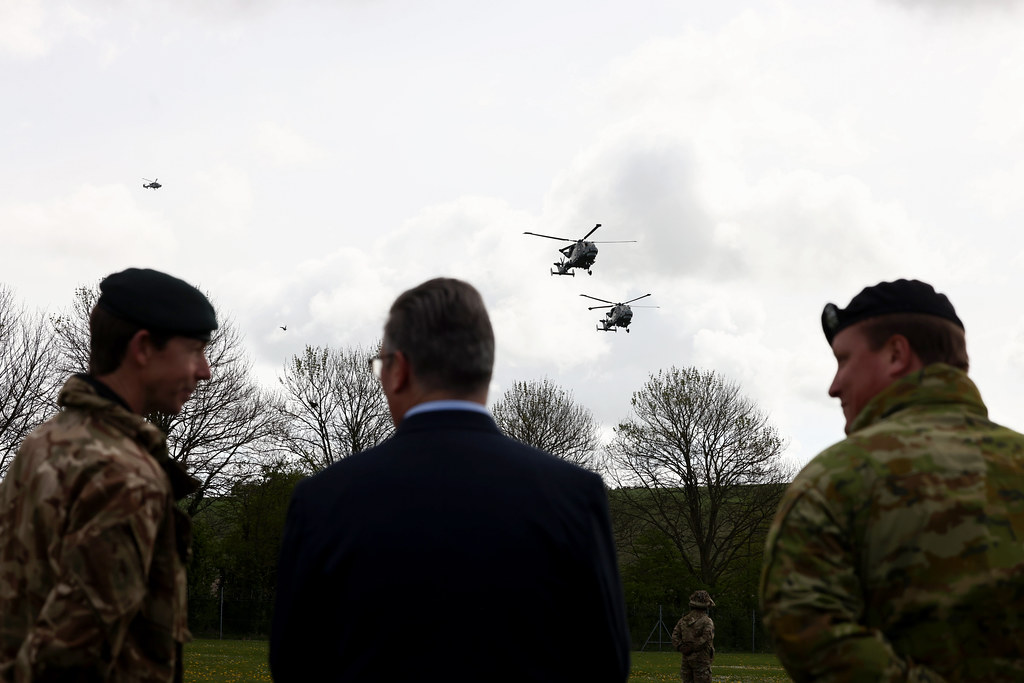
Keir Starmer visits a military training camp. Simon Dawson / No 10 Downing Street
War is coming home. The military addiction of Britain’s establishment is now taking its toll directly on working people.
All this century both Labour and Tory governments have taken the country into catastrophic, unjustifiable and usually illegal conflicts – Afghanistan, Iraq, Libya, Syria and Yemen. Millions have mobilised against these interventions. However, none of these wars had a direct and immediate impact on living standards here.
That is now changing. Under pressure from Trump, Labour has agreed to boost military spending from two per cent of Gross Domestic Product (GDP) to 3.5 per cent over the next few years, and enormous increase.
Already the overseas aid budget has been eviscerated to pay for this boost to the arms bill. Which means that already children and families in some of the poorest countries are suffering because of Starmer’s choices.
But that is only the beginning. Rachel Reeves has been forced to row back on her attempts to squeeze pensioners through ending the winter fuel allowance and to cut £5 billion a year from the welfare budget for disabled people.
However, there is little doubt that she will resume the search for savings from vital public services. That is mandated by her commitment to keep within rules designed by the Treasury and the City of London to keep the bond markets sweet.
Yet the military is to be exempted from this drive for a renewed austerity. It is vital that the trade union movement recognises that these two policies – austerity at home, preparations for war abroad – are deeply inter-connected.
Some pretend that we can have guns and butter. That is not living in the real world. Billions are going to be spent on weaponry which could better be used to meet basic needs of working people. That is the stark choice.
Of course, unions have an obligation to defend their members’ jobs. But they should also express the interests of the working class as a whole, and not capitulate to short-term sectional concerns at the expense of overall unity. That way lies division and a weakening of the movement.
The vast increases in arms spending projected will not generate many new jobs in any case. Military investment is capital intensive, with a very high technological component.
Moreover, Trump’s shakedown approach to his “allies” will ensure that much of the new money is spent on military supplies from the USA. Supine Starmer will accept whatever conditions the White House lays down.
The TUC seriously blundered in agreeing to campaign for more military spending in 2022. It is divisive, pitting unions in manufacturing against those in public services. It goes beyond the defence of members’ jobs to demanding a bigger share of government cash for weaponry.
And it is wrong in principle. Look at the record of the British elite this century, the criminal wars it has fought. And look at it support for Israel in its genocide in Gaza, its bombing of Yemen, its pointless provocations against China. Are these people to be trusted with still more weapons of mass destruction?
Arguments that the weapons are needed to protect Britain from rogue states ignore the fact that, on the record of the last generation, few states are as rogue as Britian in terms of fighting illegal wars.
And a Russia that has spent more than three years advancing at a snail’s pace through eastern Ukraine, suffering enormous losses as a result of its aggression, poses no realistic threat to Britain except hypothetically through the use of nuclear weapons, against which no amount of military spending offers any realistic protection.
Yet Labour is sparing no effort to whip up a war psychosis. It is working to obstruct any possibility of a settlement to the Ukraine conflict and is pouring money into the unwinnable war there.
And it is building up its war alliance with Japan directed at China – the Prince of Wales aircraft carrier is docked in Tokyo, along with War Secretary John Healey, as this is being written. That is where the budget for public services is being blown.
The main beneficiaries from this policy will be arms monopolies. A recent headline in the Financial Times says it all: “European Defence Sector Rally Falters on Ukraine Peace Talks.” Peace is bad for business.
That cannot be the policy of the trade union movement. We must advance an internationalist policy of peace and disarmament, with guarantees to protect the skilled work being done in what is presently the arms manufacturing industries.
Workers are already paying the price of the war drive in a fresh round of austerity. But they will pay a greater price still if the policy of hitching Britain to back of the US war chariot drags us into new conflicts, above all with China.
A war will not spare workers in the military industries – or any of us. The slogan “welfare not warfare” not only expresses the immediate interests of British workers, it is the approach the working people of the world have a right to expect from the labour movement in the home of British imperialism.
Source: Labour Outlook